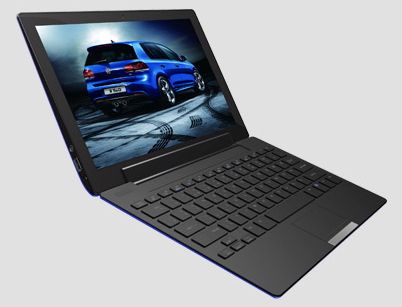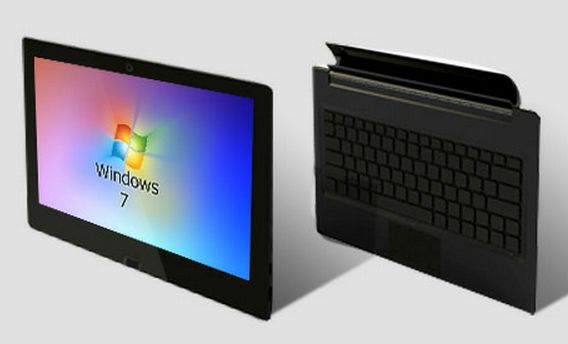 We just dug up an interesting product from Chinese manufacturer CZC Tech. The U116T is an 11.6″ Ultrabook with a detachable keyboard. Naturally, all of the essential computing parts are thus contained within the screen itself, leaving the keyboard as a productivity add-on (and extra battery) for when you want to get desk work done. Pop the screen off of the keyboard and you’ve got a lightweight tablet for couch-surfing. With Windows 7 I wouldn’t be very interested, but with Window 8’s enhanced touch functionality just around the corner, the U116T is definitely one to watch and we should be seeing it shown off at Computex come June 5th.
We just dug up an interesting product from Chinese manufacturer CZC Tech. The U116T is an 11.6″ Ultrabook with a detachable keyboard. Naturally, all of the essential computing parts are thus contained within the screen itself, leaving the keyboard as a productivity add-on (and extra battery) for when you want to get desk work done. Pop the screen off of the keyboard and you’ve got a lightweight tablet for couch-surfing. With Windows 7 I wouldn’t be very interested, but with Window 8’s enhanced touch functionality just around the corner, the U116T is definitely one to watch and we should be seeing it shown off at Computex come June 5th.
This is an Ivy Bridge based unit which is great because it means maximum efficiency (battery life) and low TDP (thermal output) which is essential for an x86-based tablet. The company doesn’t specify whether the CPUs on offer will be Core i3, i5, or i7, (I’d say i3 or i5 if I had to guess based on heat requirements) but they do specify up to 4GB of DDR3 RAM and your choice of 16/32/64/128GB SSD storage. Unsurprisingly, the U116T will use the integrated HD 4000 graphics featured on Intel’s Ivy Bridge processors, rather than going with a discrete option.
The 11.6″ screen has a 1366×768 resolution that is par for the course for that size. This is a capacitive touchscreen that supports up to 10-finger multitouch.
For ports, the U116T has a 3.5mm headphone jack, 1xUSB 2.0, 1xUSB 3.0, microSD slot, SIM card slot (for integrated data options), and even an ethernet/LAN (RJ45) port.
Though the photos available currently don’t seem to support this, the specifications seem to suggest that the keyboard adds even more: an integrated battery to charge and power the tablet, and an extra USB 2.0 and USB 3.0 port.
There’s also an optional fingerprint scanner, but it isn’t clear whether or not this would be on the screen or the keyboard.
We’re expecting to see the U116T shown off at Computex thanks to a listing for the unit on the tradeshow’s website. Computex starts on June 5th, be sure to check back with us!
The official product page for the U116T is right here, if you’re confident in your Chinese skills, go have a look! There’s no mention of a release date or price for the CZC Tech U116T at this point.












Looks like this is the same computer as the Teso K116:
http://liliputing.com/2012/03/teso-k116-ultrabook-features-a-tablet-top-detachable-keyboard.html
Yup. The other one is the Compal design seen at CES. (With the inductive charging loop.) Will you be at Computex Brad?
I wonder if it’s going to be top heavy with the keyboard.
I think most likely.
The lightest i-core CPU tablets we’ve seen are still around 800 – 900 gm. And I somehow think these previously-unheard manufacturers won’t be able to break the 800gm mark.
For the form factor to be meaningful, the whole package needs to be well under 1.4Kg, 1.5 Max. that leaves 600 – 700 gm for the keyboard part.
With the hinge sitting right at the kink, there is a very good chance that finger pokes to the touchscreen will make the clamshell topple…
UNLESS! unless they put the centre of gravity (COG) of the tablet near the hinge, which they did, AND put the COG of the keyboard part near the palm-rest, which I’m not sure they did.
I think they’ll be able to offer range of processors all the way to Core i7. On Tablet mode they can just use 14W cTDPdown.
An interesting concept, though I still prefer a Hybrid option.
You make alot of trade-offs going with Intel just to have backwards compatibility with x86 programs (thicker, heavier, worse battery life, inactive stand-by) instead of ARM.
I don’t see these types of devices doing well.
ARM is thinner, lighter, and runs longer but it’s also a lot less powerful.
While Intel is also adding a lot of features like Rapid Start Technology to better match the almost instant on capabilities of ARM, Always up-to-date should help to compensate for the normal standby disadvantage.
You completely missed the point. Metro apps are identical on both x86 & ARM, so “power” does not matter.
The ONLY reason to get an Intel version is for backwards compatibility with x86 programs, in which place all the negatives still apply.
@Luddie, wrong because only Windows RT is mostly limited to just Metro apps (MS own apps like Office being the exceptions). While x86 Windows 8 will still support Classic Desktop and Metro Desktop!
Besides, it doesn’t change the fact that those apps can run faster and easier on a more powerful computer, which only x86 can provide right now.